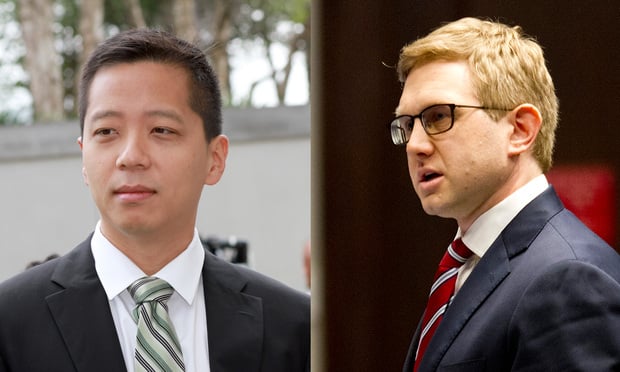Attorneys on Both Sides of Abortion Suit Seek a Win Without Trial
SisterSong attorney Sean J. Young said Georgia's law "flies in the face of nearly a half century" of SCOTUS precedent. Defending the governor and the AG, Solicitor General Andrew Pinson argued that SisterSong has "failed to establish standing to bring this suit" because the women's advocacy group hasn't proven any of its members are currently pregnant and seeking an abortion.
February 21, 2020 at 02:34 PM
5 minute read
 Sean J. Young of the ACLU of Georgia (left) and Andrew Pinson, solicitor general, state of Georgia. (Photos: John Disney/ALM)
Sean J. Young of the ACLU of Georgia (left) and Andrew Pinson, solicitor general, state of Georgia. (Photos: John Disney/ALM)
Lawyers on both sides of the challenge to Georgia's abortion ban asked to be declared the winner Thursday.
Groups challenging the law filed a motion for summary judgment late in the day of the deadline for pleadings. The state soon followed with the same motion.
Both call on Judge Steve Jones of the U.S. District Court for the Northern District of Georgia to skip the trial and make a ruling on the law. House Bill 481, also called the Living Infants Fairness and Equality Act, outlaws abortion after the point at which doctors can detect an embryonic pulse, which opponents argue is before many women would know they're pregnant. The judge has already blocked enforcement of the law while the litigation is pending.
"H.B. 481 flies in the face of nearly a half century of Supreme Court precedent, beginning with Roe v. Wade, 410 U.S. 133 (1973)," the women's rights groups' brief in support of their motion said. "As this Court has already recognized in entering a preliminary injunction, it is bound by that precedent to hold that the State may not ban abortion before the point of fetal viability."
ACLU Georgia Legal Director Sean J. Young represents the lead plaintiff, SisterSong Women of Color Reproductive Justice Collective. Young's legal team includes Susan Talcott Camp of the American Civil Liberties Union Foundation and Emily Nestler of the Center for Reproductive Rights.
"As a reproductive justice organization based in Georgia for over 20 years, SisterSong is committed to centering and amplifying the needs of those communities historically pushed to the margins," executive director Monica Simpson said in a statement released late Thursday. "Georgia's maternal mortality rate is the second highest in the nation and Black women in our state are dying at six times the national average. SisterSong is bringing this lawsuit to protect maternal health and reproductive rights so that every person—especially persons of color—can thrive in their families and communities as well as maintain their human right to make their own decisions about their reproductive lives."
SisterSong, along with other advocacy groups and women's health care providers, sued Georgia Gov. Brian Kemp, Attorney General Chris Carr and prosecutors around the state seeking to block enforcement of the law. Solicitor General Andrew Pinson is tasked with defending the state officials. Carr and Pinson have hired outside counsel, Consovoy McCarthy in Washington, D.C. The Consovoy team includes: Jeffrey M. Harris, Patrick Strawbridge and Steven Begakis.
Harris signed the brief the state filed Thursday, saying the AG and the governor should win based on standing—that none of the women suing are currently in need of an abortion.
"Defendants are entitled to summary judgment on all claims on the ground that Plaintiffs have failed to establish standing to bring this suit," Carr's lawyers said. "Plaintiff SisterSong Women of Color Reproductive Justice Collective lacks associational standing because it has not identified a single one of its members who would have standing in her own right (i.e., a pregnant woman seeking an abortion who claims she would be affected by the LIFE Act)."
Carr declined to comment on the case beyond what is said in his brief in support of the motion for summary judgment. Carr argued in the brief that, even if the judge finds parts of the law unconstitutional, other parts should remain—namely a provision giving an embryo the status of a person for purposes of child support, tax deductions and medical malpractice claims.
"Plaintiffs have never challenged the definition of 'detectable human heartbeat' as vague or unconstitutional; they have instead challenged the definition of 'natural person,'" Carr's defense attorneys said in the brief. "Even if one or more of the definitions … had some unconstitutional applications—which the State disputes—any such applications could easily be severed from provisions of the Act that operate independently, such as the child support, tax deduction, and tort damages provisions."
Jones held a two-hour hearing on the case on Sept. 23, 2019. Among other things, lawyers for the two sides argued over whether the law is a ban, since it allows the procedure before the detection of an embryonic pulse and after, in certain cases, an already reported rape or danger to the life of the mother. Jones said then that he expected to schedule the case for trial early in 2020. He issued the preliminary injunction Oct. 1.
In an order setting the Thursday deadline for pleadings, Jones gave each side an additional 30 days to respond to the other's motions.
Georgia's new law is one of the most restrictive in the country, but it is far from alone. A dozen states passed abortion bans just last year. The most extreme was Alabama, which banned all abortions with no exceptions. None of those new laws has taken effect. All have been blocked or have challenges pending. Just this week, the U.S. Court of Appeals for the Fifth Circuit blocked enforcement of a law in Mississippi similar to the one being litigated in Georgia.
The Georgia case is SisterSong Women of Color Reproductive Justice Collective v. Brian Kemp, Civil Action No.: 1:19-cv-02973-SCJ.
This content has been archived. It is available through our partners, LexisNexis® and Bloomberg Law.
To view this content, please continue to their sites.
Not a Lexis Subscriber?
Subscribe Now
Not a Bloomberg Law Subscriber?
Subscribe Now
NOT FOR REPRINT
© 2025 ALM Global, LLC, All Rights Reserved. Request academic re-use from www.copyright.com. All other uses, submit a request to [email protected]. For more information visit Asset & Logo Licensing.
You Might Like
View All
Georgia Republicans Push to Limit Lawsuits. But Would That Keep Insurance Rates From Rising?
5 minute read
A Plan Is Brewing to Limit Big-Dollar Suits in Georgia—and Lawyers Have Mixed Feelings
10 minute readTrending Stories
Who Got The Work
J. Brugh Lower of Gibbons has entered an appearance for industrial equipment supplier Devco Corporation in a pending trademark infringement lawsuit. The suit, accusing the defendant of selling knock-off Graco products, was filed Dec. 18 in New Jersey District Court by Rivkin Radler on behalf of Graco Inc. and Graco Minnesota. The case, assigned to U.S. District Judge Zahid N. Quraishi, is 3:24-cv-11294, Graco Inc. et al v. Devco Corporation.
Who Got The Work
Rebecca Maller-Stein and Kent A. Yalowitz of Arnold & Porter Kaye Scholer have entered their appearances for Hanaco Venture Capital and its executives, Lior Prosor and David Frankel, in a pending securities lawsuit. The action, filed on Dec. 24 in New York Southern District Court by Zell, Aron & Co. on behalf of Goldeneye Advisors, accuses the defendants of negligently and fraudulently managing the plaintiff's $1 million investment. The case, assigned to U.S. District Judge Vernon S. Broderick, is 1:24-cv-09918, Goldeneye Advisors, LLC v. Hanaco Venture Capital, Ltd. et al.
Who Got The Work
Attorneys from A&O Shearman has stepped in as defense counsel for Toronto-Dominion Bank and other defendants in a pending securities class action. The suit, filed Dec. 11 in New York Southern District Court by Bleichmar Fonti & Auld, accuses the defendants of concealing the bank's 'pervasive' deficiencies in regards to its compliance with the Bank Secrecy Act and the quality of its anti-money laundering controls. The case, assigned to U.S. District Judge Arun Subramanian, is 1:24-cv-09445, Gonzalez v. The Toronto-Dominion Bank et al.
Who Got The Work
Crown Castle International, a Pennsylvania company providing shared communications infrastructure, has turned to Luke D. Wolf of Gordon Rees Scully Mansukhani to fend off a pending breach-of-contract lawsuit. The court action, filed Nov. 25 in Michigan Eastern District Court by Hooper Hathaway PC on behalf of The Town Residences LLC, accuses Crown Castle of failing to transfer approximately $30,000 in utility payments from T-Mobile in breach of a roof-top lease and assignment agreement. The case, assigned to U.S. District Judge Susan K. Declercq, is 2:24-cv-13131, The Town Residences LLC v. T-Mobile US, Inc. et al.
Who Got The Work
Wilfred P. Coronato and Daniel M. Schwartz of McCarter & English have stepped in as defense counsel to Electrolux Home Products Inc. in a pending product liability lawsuit. The court action, filed Nov. 26 in New York Eastern District Court by Poulos Lopiccolo PC and Nagel Rice LLP on behalf of David Stern, alleges that the defendant's refrigerators’ drawers and shelving repeatedly break and fall apart within months after purchase. The case, assigned to U.S. District Judge Joan M. Azrack, is 2:24-cv-08204, Stern v. Electrolux Home Products, Inc.
Featured Firms
Law Offices of Gary Martin Hays & Associates, P.C.
(470) 294-1674
Law Offices of Mark E. Salomone
(857) 444-6468
Smith & Hassler
(713) 739-1250








